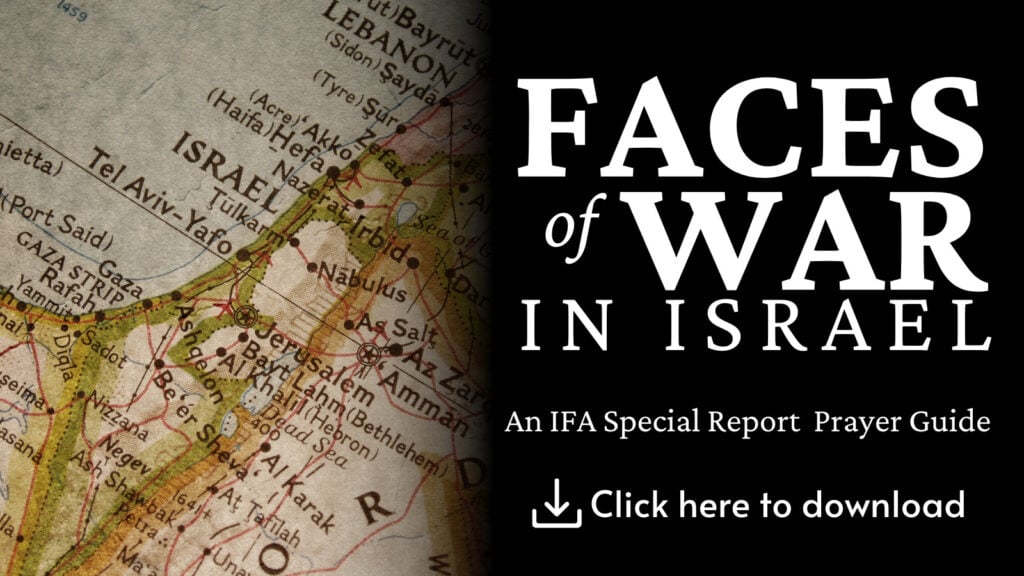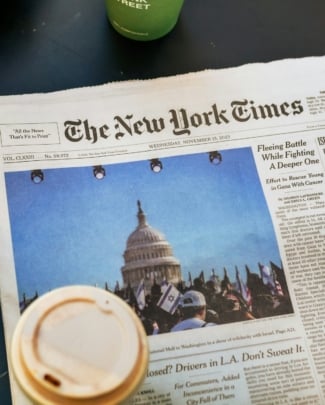A Social Jihad
House Votes to Formalize Impeachment Inquiry
Poll: Half of Young Americans Doubt the Holocaust
Surprising Voter Fraud Poll
Archaeological Discovery Offers Hope for Israel
A Social Jihad
This article, originally published at Frontier Alliance International, shows how younger Americans lost their favorable view of Israel, as well as how their new view may impact the future.
From Frontier Alliance International. FROM BOOMERS TO ZOOMERS
The nineteenth century French philosopher Auguste Comte once wrote, “Demography is destiny.” That is, demographic trends can be key indicators regarding the future direction of a people, a nation, and even the world. Although Comte’s pithy quote may be overly dramatic and overly simplified, it certainly contains a pearl of wisdom for us in this season of world history. A fundamental, generational sea change is underway in the Western world, and it has broad, even prophetic implications for the Middle East and the State of Israel in particular.
This content is supported by your donations.
Give today.
The numbers don’t lie. Generation Z is now the world’s single largest generation. In the United States, Zoomers make up almost a quarter of the total population at 68 million. Combined with Millennials, almost half of the American population is not quite over the hill. The generational ratio is more subdued in the aging European Union, where the overall birth rate has settled around 1.5 children per household (while a rate of 2.1 children per household is necessary to simply maintain the size of a population). But the opposite is true in the Middle East and North Africa, where almost half of the region’s population is under the age of 25, a massive demographic trend known as the Youthquake.
Each generation is shaped by a common, formative experience. At the dawn of Gen Z in the late 1990’s, through its waning years in the early 2010’s, the world was on a political and economic upswing, interrupted only briefly during their early childhood. Zoomers missed the Cold War and they were too young to remember 9/11. They didn’t fight in the War on Terror or lose their jobs in the Great Recession. They have only experienced a post-Soviet world, and have been the greatest beneficiaries of a global free-trade economic order which has ushered in the most affluent period in world history. They are also the most educated generation in history, with 57% enrollment in higher education, compared to 52% of Millennials and 43% of Generation X. And Zoomers are undoubtedly more socially progressive than their predecessors, prioritizing the role of government in the life of its citizens, racial issues, gender equality, immigration, and LGBTQ advocacy.
But more importantly, the defining experience of Gen Z worldwide has been the advent of mobile technology. As the first Zoomers were becoming adolescents in 2007, the first iPhone was being released. Facebook and Twitter were launching. The mobile app market was proliferating. Music and video streaming services were beginning to compete with cable and MP3’s. Google had become both a noun and a verb in the public lexicon. And importantly, corporations (and governments) were beginning to leverage “big data” in the way that apps, engines, and algorithms monitored and interacted with users in cyberspace. Over the course of the next decade, this technology has been increasingly developed, refined, and has been deployed across social media platforms. Advancement has taken place in orders of magnitude, culminating in a new generation of AI platforms this year. In effect, whether guided by political ideals or just economic opportunism (or both), big tech companies across the world have created social spaces in which users can see what they want to see, hear what they want to hear, say what they want to say, and interact with the things that they want to experience. By using mobile technology, they can do it for hours, every day, anywhere. It’s an incredibly lucrative business model. It’s a tool of enlightenment and organization outside of the boundaries of government control or social norms. But in the context of a growing social and cultural movement, it can be a recipe for disaster.
GENERATION Z(EITGEIST)
As expected, the generational gap between Boomers and Zoomers concerning the State of Israel is wide. In America, where support for the State of Israel is strongest in the West, two-thirds of Americans over the age of 50 have a favorable view of Israel. That support drops to 51% between the ages of 30-49 (Gen X and Millennials). At only 42% favorability, Gen Z is the first generation with a majority unfavorable view of the Jewish State since its inception seventy-five years ago. In Britain, the data is even worse. Only 7% of Brits ages 18-34 strongly support Israel in the current Gaza War. This disturbing trend even applies to younger Jews in the West. In a 2020 poll of Jewish Americans, 58% overall affirmed a felt, personal connection with the State of Israel. But for American Jews under 30, that number drops to less than half. Shockingly, in a 2021 survey by the Jewish Electorate Institute, a whopping 1 in 3 American Jews under the age of 40 agreed with the belief that Israel is committing genocide against the Palestinians. The number fell below 1 in 5 for Jews over 40.
Even before the Hamas massacre of October 7th, 2023, the concerning trend of antisemitic content on social media platforms was obvious and demonstrable. The University of Haifa published a report in 2021 that antisemitic content had skyrocketed more than 900% on the Chinese-owned platform TikTok in just one year. Posts with antisemitic content had increased by over 40%, while usernames with antisemitic connotations such as @holocaustwasgood or @eviljews had increased more than 1300%. The data is especially shocking when considering that TikTok is the social media app of choice for Gen Z. Forty percent of its 1.2 billion users worldwide are under the age of twenty-one.
But TikTok is not alone. Also in 2021, the Center to Counter Digital Hate (CCDH) released a study exposing the top five social media platforms, including Facebook, Twitter, Instagram, TikTok, and YouTube, for a lack of enforcement of their own community standards when it came to antisemitic content. The CCDH examined hundreds of antisemitic posts with millions of views on each platform. Despite the fact that they were all flagged for policy violations, only 15% were eventually removed.
Of course, the problem of antisemitism on social platforms has only metastasized since the Hamas massacre of October 7th and the Gaza ground invasion which has followed. In the first 30 days of the war, the most popular pro-Palestinian hashtag, #FreePalestine, was viewed over 442 million times on TikTok. By comparison, the most popular pro-Israel hashtag, #IStandWithIsrael, was only viewed 16 million times. In just the last four weeks, two viral trends have emerged on TikTok, in which members claim to have entered an “existential crisis” after reading the supposed “truth” in Osama bin Laden’s Letter to America, and another in which members report that they have begun reading the Qur’an. Almost one in three Americans under 30 don’t believe what Israel and Western governments have told them about the horrors of October 7th. Worse, one in ten has a favorable view of Hamas. In the United States, that’s almost seven million people.
The cause of proliferating antizionism and antisemitism among Zoomers is a question of the chicken and the egg. Does the more progressive and politically active character of Gen Z predispose it to sympathy with the narrative that portrays Israel as a colonialist, apartheid state that oppresses Palestinians? Have those intrinsic beliefs fed the antisemitic narratives on social media? Or does the growth of these narratives on social media shape and mold the antisemitism in younger viewers?
Perhaps the answer lies with a mixture of both, as malicious content on social platforms is designed and precisely targeted like a laser-guided hate bomb squarely at the political preferences of its younger audience. For a generation that cares deeply about racial and economic justice, the Israeli-Palestinian conflict is framed as affluent and “white” European Jews versus poor, brown Palestinians (while conveniently ignoring the fact that over half of Israeli Jews are Mizrahim and Sephardim from the Middle East and North Africa). For a generation that cares deeply about political emancipation and individual liberation, the Israeli-Palestinian conflict is framed as desperate Palestinian resistance against Israeli colonialism, apartheid, and even genocide. In short, the false narratives of the Israeli-Palestinian conflict target the most positive qualities of Gen Z and turn them on their head as fuel for the world’s oldest hatred. A wider, regional view of the conflict, in which Islamist powers such as Iran, Turkey, and Qatar are exploiting Palestinians as proxies to attack Israel, are ignored. The comparative size of Israel in relationship to the Arab World, both in terms of population and geography, is also ignored. Instead, the myopic view of this narrative requires Israel to be Goliath, and for Palestinians to be rock-slinging Davids.
These elements of the narrative trump all other priorities of Zoomers writ large. Despite the fact that Tel Aviv is the most “gay-friendly” city in the world, the Internet is full of Queers and Trans for Palestine. Although Israel is by far the most gender-progressive nation in the Middle East, and despite the overwhelming evidence of Hamas’ sexual crimes on October 7th, female advocacy organizations are afraid to speak out in defense of Israeli women. Despite the fact that real genocides and ethnic cleansings has been documented over the last decade in Iraq, Syria, and Azerbaijan, the world’s only Jewish State is seemingly the only regional power guilty of genocide on TikTok and Instagram.
FOLLOW THE CLICKS
But where did this narrative come from? How did the Jew-hating conspiracy-ridden fringes of the extreme left and right begin seeping into the center of Generation Z? The reasons for any mass social and political trend are myriad. Sociologists and political scientists can wax eloquent on any number of factors, trends, and data points. Some pundits and commentators have pointed at the anti-Israel rallies on Western university campuses, claiming that fifty years of anti-Zionist higher education is to blame. Others look to geopolitical factors which allow Israel to be framed as a heavy-handed victor against the Palestinian underdog, and not as the underdog themselves in the struggle against Arab powers that defined the first fifty years of its national history. Although both of these factors may play a part, they do not entirely explain the larger picture. One liberal, Jewish professor at Georgetown University described it this way,
“Truth be told, I’m skeptical that professors of any political persuasion could successfully ‘indoctrinate’ their students if they wanted to. I don’t doubt that there is a general vibe of intellectual anti-Zionism in some college lecture halls. But my sense is that professors nowadays don’t really shape the Gen Z worldview. This generation of college students gets its facts from Google. It forges its politics via TikTok, YouTube, Twitch, Reddit, Telegram, BreadTube and Instagram. Any professor who wants to be a political influencer should abandon the classroom and log on to these platforms.”
Indeed, studies of Gen Z have revealed a general lack of trust in institutions, including the government, traditional media, and universities. Although Gen Z is the most college-educated generation in history, it is also the most suspicious of the college education that it receives, with more than half of Zoomers surveyed in 2022 stating that they don’t trust their professors, or at least aren’t sure if they can. Instead, individual Internet research and independent online media are the preferred information sources of young people. In theory, this can be a good thing, as a largely unregulated Internet allows for a large marketplace of ideas. But in reality, the lack of regulation is a double-edged sword that cuts both ways. For-profit tech companies take advantage of the lack of regulatory oversight, building apps, algorithms, and AI that will push users toward content which maximizes profit. Investors with Islamist leanings and millions of dollars hire teams of paid staff to build a following in the hundreds of thousands on Instagram by producing anti-Israel content that appeals to Gen Z notions of justice, working the algorithm to rank higher in feeds, compounding views and clicks, and earning more money. In time, the trend becomes a self-perpetuating machine of content production and user consumption.
THE DESTINY OF OUR DEMOGRAPHY
But where is this headed? If demography is destiny, what is the destined end of this growing antisemitic trend among Generation Z? The answer lies not in academic analysis, but in prophetic announcement:
“Behold, a day is coming for the Lord, when the spoil taken from you will be divided in your midst. For I will gather all the nations against Jerusalem to battle, and the city shall be taken and the houses plundered and the women raped. Half of the city shall go out into exile, but the rest of the people shall not be cut off from the city.”
Just ten years ago, when support for Israel in the United States was at an all-time high, such a scenario as described in Zechariah 14 seemed unfathomable. How could such an outbreak of unspeakable horror be tolerated by the international community? How could the world stand by and watch as the surrounding nations “once again” committed that which was relegated to “never again” for the past 80 years?
October 7th holds the answer to these questions. When false narratives of Jewish injustice, corruption and oppression take hold of a generation, it is only a matter of time until words become action. In the 1930’s, those words were in printed pamphlets and radio broadcasts. Today, those words are in TikTok videos, Instagram posts, and sub-Reddit threads. Not only will the horrors of Zechariah’s vision be tolerated by most, but they will also be openly celebrated by many. The most dangerous perpetrator is the one who believes that his victim is his oppressor. It was true in 1930’s Europe, and it’s increasingly true across the world today.
But there is hope. Zechariah’s prophecy turns from suffering to triumph in the very next verse. “Then the Lord will go out and fight against those nations as when he fights on a day of battle.” The Jewish Messiah will personally bring Jew-hatred to an end “on a day of battle.” He will trample the nations under His feet and lock away the evil one who deceived them. Then, ironically, the justice and equality which Generation Z longs for will be finally achieved, and a Kingdom of Righteousness, with its capital in Jerusalem, will bring a true end to war, abuse, and genocide. If the world is hell-bent on feeding Gen Z with the antisemitic doctrines of demons, may the churches reach Zoomers with the good news of a coming Kingdom, where Israel is not an enemy, but our co-heir and brother.
Maranatha.
Share your prayers for America, Generation Z, and Israel below.
(Used with permission. By Gabriel Caligiuri from Frontier Alliance International. Photo Credit: Michael M. Santiago/Getty Images)
Partner with Us
Intercessors for America is the trusted resource for millions of people across the United States committed to praying for our nation. If you have benefited from IFA's resources and community, please consider joining us as a monthly support partner. As a 501(c)3 organization, it's through your support that all this possible.


We use cookies to ensure that we give you the best experience on our website. If you continue to use this site we will assume that you are happy with it. Privacy Policy





Comments
That was a very good and insightful article! My prayer is for peace and strength in Jerusalem and all of Israel. I pray that the true history of Israel is taught to the younger generation Z. Even through all the social media platforms! Dear Lord, open their hearts and minds to Your love for Your people Israel. Let David’s words be fulfilled in this present conflict : ”I come to you in the name of the LORD of hosts, the God of the armies of Israel, whom you have defied. This day the LORD will deliver you into my hand, and I will strike you down and cut off your head. And I will give the dead bodies of the host of the Philistines (HAMAS) this day to the birds of the air and to the wild beasts of the earth, that there is a God in Israel, and that all this assembly (GENERATION ZOOMERS) may know that the LORD saves not with sword and spear. For the battle is the LORD’S, and he will give you into our hand.” AMEN!
Love this boomer to zoomers. God gives creative words for those who are hearing his voice. IJN
@”They are also the most educated generation in history, with 57% enrollment in higher education …”
The most indoctrinated generation in history is what they are — the most propagandized generation in history. This is an extremely serious problem.
Western universities and academic systems are a disgrace. Lives and souls are being destroyed — perhaps forever.
LORD, I’m asking You to open blind eyes, deaf ears, and closed hearts. And please make haste, O God.
looks like we left a generation behind. Pray for them.